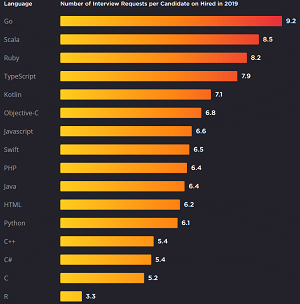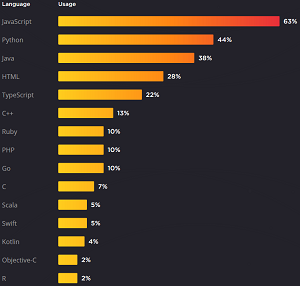News
TypeScript Among Most In-Demand Programming Languages in Software Engineering Report
Careers firm Hired published its 2020 State of Software Engineers report, examining various topics such as the hottest jobs in software engineering, salaries and most in-demand programming languages.
Of interest to Microsoft-centric developers is that latter category as the company's open source TypeScript language cracked the top five, behind Go, Scala and Ruby. That designation is based on the number of interview requests per candidate on the Hired platform in 2019. With its fourth-place finish, TypeScript, a JavaScript-based language with optional static typing, beats out languages such as Kotlin, JavaScript, Swift, Java, Python and more.
 [Click on image for larger view.] Most In-Demand Coding Languages Across the Globe (source: Hired).
[Click on image for larger view.] Most In-Demand Coding Languages Across the Globe (source: Hired).
Another Microsoft language, C#, didn't fare as well, placing 14th on the list, ahead of only C and R. That's in direct contrast to recent multiple other reports that feature C# much more prominently.
On the list of most-used programming languages, TypeScript dropped one position to fifth place, while C# didn't even make the cut.
 [Click on image for larger view.]Most Commonly Used Programming Languages by Software Engineers (source: Hired).
[Click on image for larger view.]Most Commonly Used Programming Languages by Software Engineers (source: Hired).
Other than the above, there isn't too much of special interest to Microsoft developers. .NET Core, for example, isn't even mentioned.
On a broader level, highlights of the report as listed by Hired include:
- Python, JavaScript, and Java are engineers' favorite coding languages, largely because of their useful and well-maintained libraries and packages.
- Ruby, PHP and Objective C are ranked the least favorite (and least fun) languages for software engineers.
- Software engineers want to learn about machine learning more than any other type of tech.
- Security engineers remain in high demand for 2019 with 49 percent growth. However, this is significantly slower than the 132 percent growth rate in 2018.
- While emerging tech trends continue to make headlines, demand for frontend and backend engineers grew steadily by 17 percent in 2019, which shows that all companies — not just Silicon Valley tech giants — are evolving into being a tech company.
- In 2019, average salaries for top engineering roles went up by nearly 13 percent in London, 7 percent in Toronto, 7 percent in New York, and 6 percent in the SF Bay Area.
- Global warming, lack of economic opportunity and lack of access to education are the top 3 problems software engineers want to solve through coding.
- 66 percent of software engineers think coding exams are irrelevant to the daily job of an engineer.
- Majority of software engineers are early birds and nearly half would rather work in an office every day than be 100 percent remote.
- Electronic music is the top genre of choice for software engineers at work.
Methodology for the report included gathering proprietary information from the company's data science team, reflecting data from more than 400,000 interview requests and job offers over the past year facilitated through Hired's marketplace of more than 10,000 participating companies and 98,000 job-seekers. Survey responses from more than 1,600 software engineers on the platform were also used.
About the Author
David Ramel is an editor and writer at Converge 360.